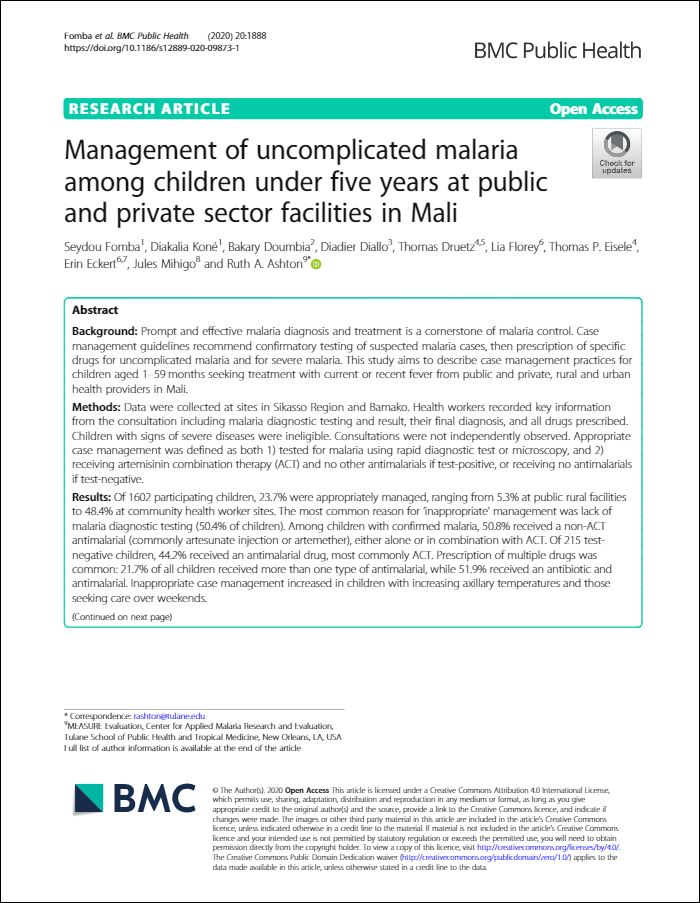Management of uncomplicated malaria among children under five years at public and private sector facilities in Mali
Link to Document:
s12889-020-09873-1
s12889-020-09873-1

Citation: Fomba, S., Koné, D., Doumbia, B. et al. Management of uncomplicated malaria among children under five years at public and private sector facilities in Mali. BMC Public Health 20, 1888 (2020). https://doi.org/10.1186/s12889-020-09873-1
Abstract:
Background: Prompt and effective malaria diagnosis and treatment is a cornerstone of malaria control. Case management guidelines recommend confirmatory testing of suspected malaria cases, then prescription of specific drugs for uncomplicated malaria and for severe malaria. This study aims to describe case management practices for children aged 1–59 months seeking treatment with current or recent fever from public and private, rural and urban health providers in Mali.
Methods: Data were collected at sites in Sikasso Region and Bamako. Health workers recorded key information from the consultation including malaria diagnostic testing and result, their final diagnosis, and all drugs prescribed. Children with signs of severe diseases were ineligible. Consultations were not independently observed. Appropriate case management was defined as both 1) tested for malaria using rapid diagnostic test or microscopy, and 2) receiving artemisinin combination therapy (ACT) and no other antimalarials if test-positive, or receiving no antimalarials if test-negative.
Results: Of 1602 participating children, 23.7% were appropriately managed, ranging from 5.3% at public rural facilities to 48.4% at community health worker sites. The most common reason for ‘inappropriate’ management was lack of malaria diagnostic testing (50.4% of children). Among children with confirmed malaria, 50.8% received a non-ACT antimalarial (commonly artesunate injection or artemether), either alone or in combination with ACT. Of 215 test-negative children, 44.2% received an antimalarial drug, most commonly ACT. Prescription of multiple drugs was common: 21.7% of all children received more than one type of antimalarial, while 51.9% received an antibiotic and antimalarial. Inappropriate case management increased in children with increasing axillary temperatures and those seeking care over weekends.
Conclusions: Multiple limitations in management of febrile children under five were identified, including inconsistent use of confirmatory testing and apparent use of severe malaria drugs for uncomplicated malaria. While we cannot confirm the reasons for these shortcomings, there is a need to address the high use of non-ACT antimalarials in this context; to minimize potential for drug resistance, reduce unnecessary expense, and preserve life-saving treatment for severe malaria cases. These findings highlight the challenge of managing febrile illness in young children in a high transmission setting.
Background: Prompt and effective malaria diagnosis and treatment is a cornerstone of malaria control. Case management guidelines recommend confirmatory testing of suspected malaria cases, then prescription of specific drugs for uncomplicated malaria and for severe malaria. This study aims to describe case management practices for children aged 1–59 months seeking treatment with current or recent fever from public and private, rural and urban health providers in Mali.
Methods: Data were collected at sites in Sikasso Region and Bamako. Health workers recorded key information from the consultation including malaria diagnostic testing and result, their final diagnosis, and all drugs prescribed. Children with signs of severe diseases were ineligible. Consultations were not independently observed. Appropriate case management was defined as both 1) tested for malaria using rapid diagnostic test or microscopy, and 2) receiving artemisinin combination therapy (ACT) and no other antimalarials if test-positive, or receiving no antimalarials if test-negative.
Results: Of 1602 participating children, 23.7% were appropriately managed, ranging from 5.3% at public rural facilities to 48.4% at community health worker sites. The most common reason for ‘inappropriate’ management was lack of malaria diagnostic testing (50.4% of children). Among children with confirmed malaria, 50.8% received a non-ACT antimalarial (commonly artesunate injection or artemether), either alone or in combination with ACT. Of 215 test-negative children, 44.2% received an antimalarial drug, most commonly ACT. Prescription of multiple drugs was common: 21.7% of all children received more than one type of antimalarial, while 51.9% received an antibiotic and antimalarial. Inappropriate case management increased in children with increasing axillary temperatures and those seeking care over weekends.
Conclusions: Multiple limitations in management of febrile children under five were identified, including inconsistent use of confirmatory testing and apparent use of severe malaria drugs for uncomplicated malaria. While we cannot confirm the reasons for these shortcomings, there is a need to address the high use of non-ACT antimalarials in this context; to minimize potential for drug resistance, reduce unnecessary expense, and preserve life-saving treatment for severe malaria cases. These findings highlight the challenge of managing febrile illness in young children in a high transmission setting.
Shortname: ja-20-287-pmm
Author(s): Seydou Fomba, Diakalia Koné, Bakary Doumbia, Diadier Diallo, Thomas Druetz, Lia Florey, Thomas P. Eisele, Erin Eckert, Jules Mihigo & Ruth A. Ashton
Year: 2020
Language: English
Region(s): MALI